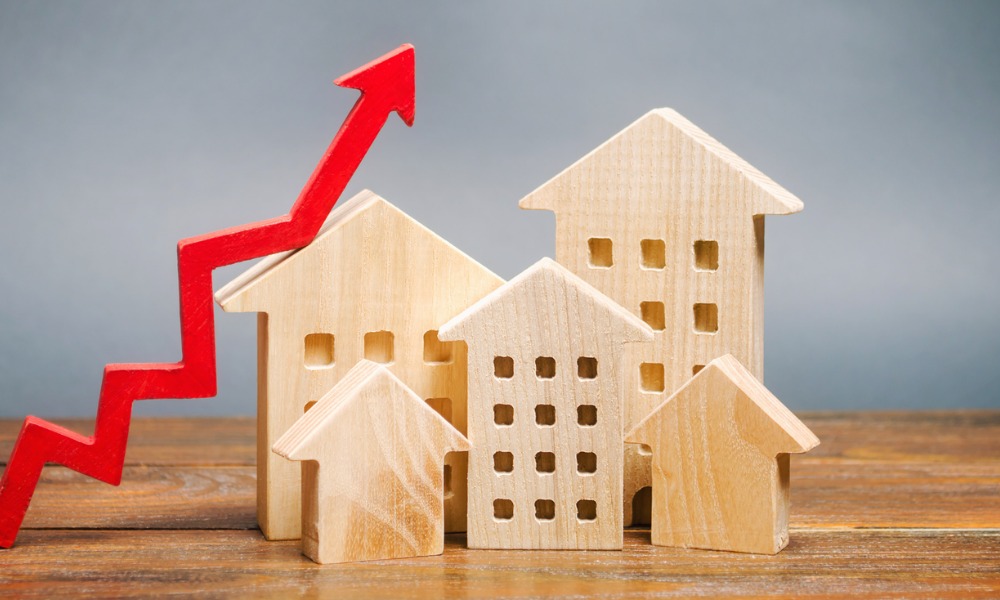Concern around buyer affordability and borrowing potential is growing

Average house prices in the UK increased by 7.8% over the year to June 2022, but is down from the 12.8% annual price growth recorded in the previous month.
According to the latest HM Land Registry (HMLR) House Price index, the average house price was £286,000 in June, which is £20,000 higher than this time last year.
Average house prices increased over the year in England to £305,000 (7.3%), in Wales to £213,000 (8.6%), in Scotland to £192,000 (11.6%), and in Northern Ireland to £169,000 (9.6%).
The East of England was the region with the highest annual house price growth, with average prices increasing by 9.7% while the lowest annual house price growth was in the North East, where average prices increased by 3.6%. London’s average house prices remain the most expensive of any region in the UK, with the average house price now at a record level of £538,000 while the North East continued to have the lowest average house price at £158,000.
Despite UK house prices increasing between the months of May and June, annual house price inflation has slowed due to rises in prices seen in June 2021, which were the result of tax break changes.
HMLR’s historic figures show that since the latter half of 2020, the UK’s average house price growth has been accelerating. This trend continued into 2021, and house price growth has remained strong since the start of 2022. The Office for National Statistics stated that the dip in the annual growth rate in June reflects the volatility in house prices throughout 2021, and in particular, the inflated prices that were seen in June last year.
“Despite a slight decrease, house price growth still remains firmly in the double digits – outstripping current inflation figures,” Simon McCulloch, chief commercial and growth officer at software provider Smoove, noted. “It’s also normal to see prices dip around this time of year as people try and enjoy the summer holidays. However, the combined effect of the rising cost-of-living and base rate rises mean that many buyers are finding their affordability squeezed.”
Mark Harris, chief executive at mortgage broker SPF Private Clients, agreed that there is growing concern around affordability and borrowing potential, as house prices continue to rise in most parts of the country and inflation soars to 10.1%.
Read more: UK inflation rate hits double digits.
“With money market rates continuing to rise, mortgage pricing is also edging up accordingly,” Harris said. “Borrowers need to move quickly to secure the best mortgage rates as they are often pulled at short notice. Service levels also vary considerably between lenders so transactions can take longer than borrowers anticipate, particularly if their case is complex, so advice is more important than ever.”
The slowdown in price growth, according to Anna Clare Harper, director of real estate technology platform IMMO, will be welcomed by those struggling with affordability constraints.
“Interest rate rises and talk of recession are cooling demand,” Harper said. “In recessionary times and when interest rates are higher, demand for buying properties tends to fall.”
She was quick to point out, however, that the shortage of supply of both properties for ownership and for rent continues.
“For this reason, the slowdown in growth should not be taken as an indicator of a major crash to follow,” Harper added.
Read more: Is the UK housing market cooling?
Nicky Stevenson, managing director at national estate agent group Fine & Country, considers the tumble in annual house price growth as “just an anomaly caused by a surge in prices last summer.”
“The underlying reality here is that the boom continues, and on a scale which is remarkable given how many headwinds there are now,” she noted. “Monthly growth has actually remained steady over the last few months.”
But this trend of price growth won’t last long, according to Stevenson, who said that while property prices continue to show a degree of detachment for now, it’s hard to see growth remaining this high in the autumn.
Graham Cox, founder of the Bristol-based broker SelfEmployedMortgageHub.com, stated he will be surprised if house prices don’t plummet at least 5% to 10% over the next 12 months.
“Property prices are unsustainable in the current economic climate,” he said. “It doesn’t matter that there’s a shortage of property, because buyers can only afford to pay what they can afford to borrow. And borrowing is getting a lot more expensive, along with everything else.”


